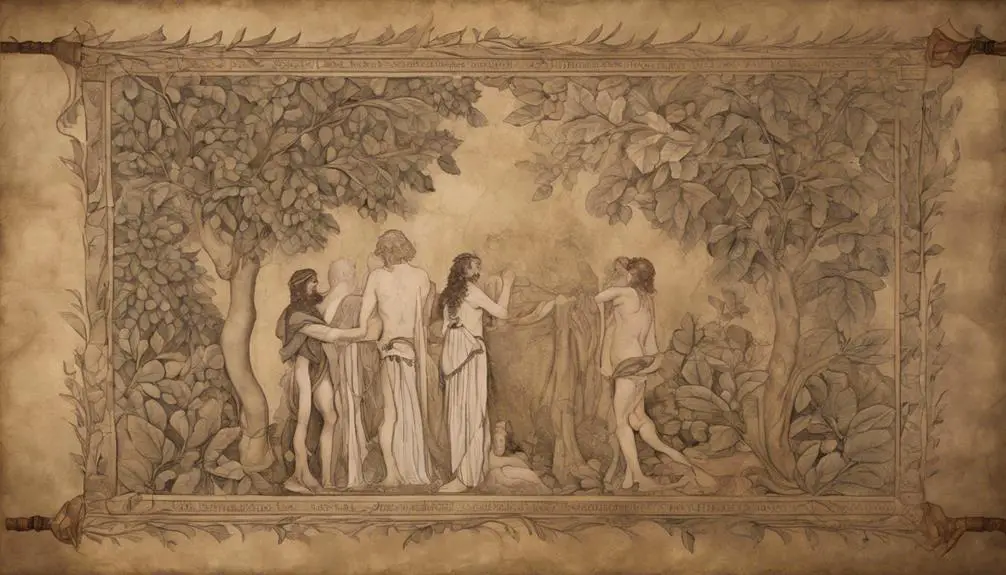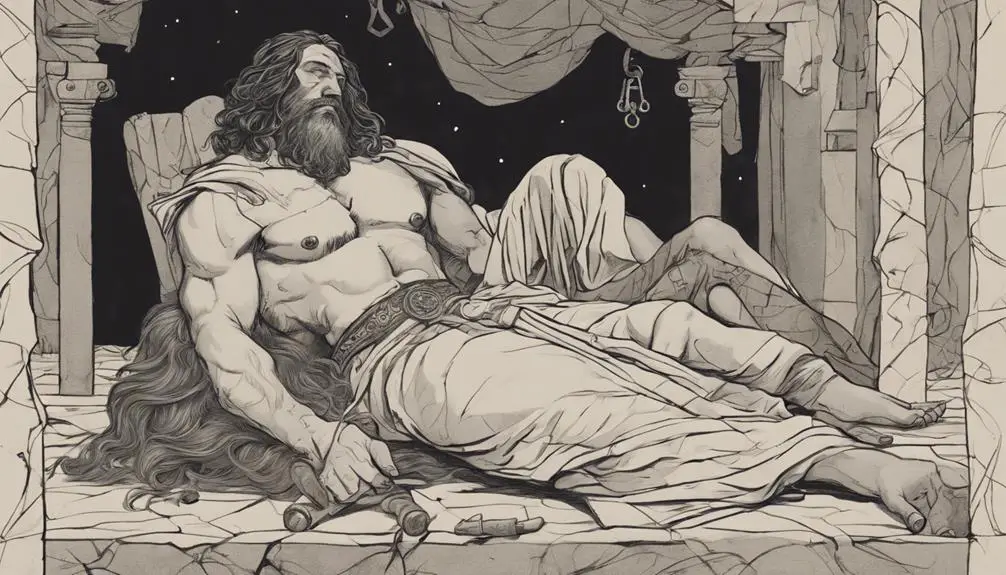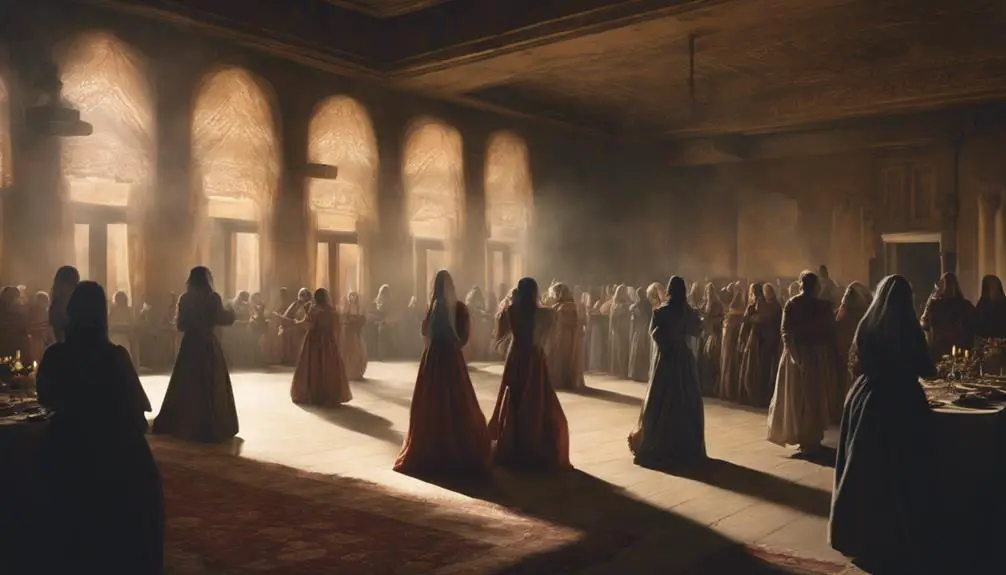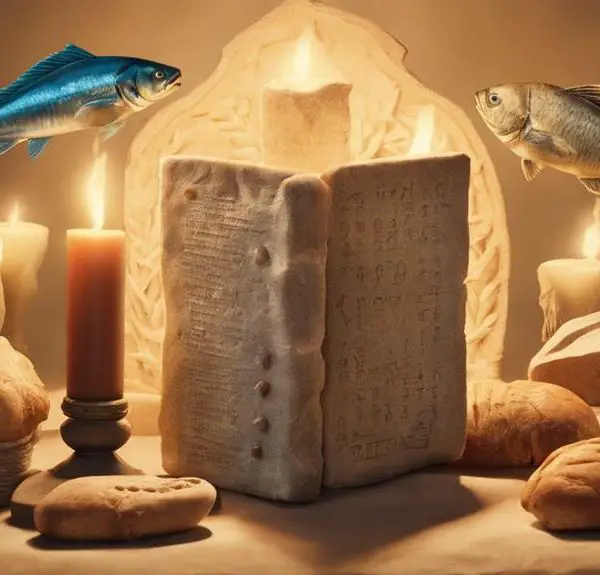Dive into the Bible's steamy tales of passion and power, uncovering timeless truths hidden within ancient scandals.

Sexual Stories in the Bible
When you think the Bible is just an ancient Kindle without the backlight, you're missing out on the intriguing narratives woven through its pages, specifically the sexual stories that reveal much about human nature and divine response.
From Joseph's refusal to Potiphar's wife, to David's scandalous affair with Bathsheba, and Solomon's insatiable appetite for love, these stories are not just spicy tidbits; they're profound reflections on power, temptation, and redemption.
As you explore these narratives, you'll uncover layers of meaning that might just challenge your perceptions of this age-old text, inviting you to look beyond the surface.
Key Takeaways
- Biblical stories often depict complex power dynamics intertwined with sexual relations, highlighting moral lessons on integrity and temptation.
- Unchecked desires and power can lead to personal downfall, as seen in narratives like David and Bathsheba's affair and Samson and Delilah's betrayal.
- Royal polygamy in ancient societies was not just about personal affections but also strategic political alliances, with wisdom sometimes overshadowed by desire.
- Betrayal and manipulation in relationships, such as Samson and Delilah's story, serve as cautionary tales about the erosion of trust and vulnerability.
The Seduction of Joseph
In the story of Joseph, one finds a compelling narrative of temptation and integrity, as he resists the advances of Potiphar's wife. This episode isn't just a tale of personal virtue but also a study in power dynamics and moral integrity within a complex societal framework. You're presented with a scenario where Joseph, despite his lower social standing and vulnerability, upholds his moral integrity against a potent temptation. This integrity isn't just a personal choice; it's a stand against the misuse of power.
Potiphar's wife, wielding her social and possibly economic power, attempts to seduce Joseph, who's essentially a servant in her household. The power dynamics at play are clear, yet Joseph's refusal shifts the balance, showcasing that moral integrity can defy societal hierarchies. This story suggests that true power lies not in one's social or economic status but in one's ability to adhere to personal ethics and moral convictions, even under pressure.
Joseph's story is a testament to the strength of character and the importance of maintaining one's integrity, despite the seductive allure of immediate gratification or the threat of retribution.
David and Bathsheba's Affair

Another narrative that deeply explores the complexities of human desire and the consequences of our actions is the affair between David and Bathsheba. This story, rich in drama and intrigue, serves as a potent illustration of the interplay between power dynamics and moral implications. At its core, the relationship between David, the king, and Bathsheba, the wife of Uriah, showcases how authority can cloud judgment and lead to devastating outcomes.
- Power dynamics: David's position of power not only facilitated his initial encounter with Bathsheba but also enabled the subsequent cover-up attempts, highlighting how authority can be misused.
- Moral implications: The affair sets off a chain of events that underscore the far-reaching consequences of our actions, particularly when they stem from a place of selfish desire and disregard for others.
- Human complexity: Despite David's role as a revered leader and a man after God's own heart, this narrative reveals his vulnerability to temptation and failure, reminding us of the complex nature of humanity.
In analyzing David and Bathsheba's affair, you're invited to reflect on the enduring lessons about the dangers of unchecked power and the importance of moral accountability.
Samson and Delilah's Betrayal

Turning our attention to the narrative of Samson and Delilah, we encounter a tale steeped in betrayal, illustrating the profound impact of personal weaknesses on one's destiny. This story, rich in themes of power dynamics and trust erosion, serves as a poignant exploration of how intimate relationships can become battlegrounds for control and deceit.
Power Dynamics |
Trust Erosion |
|---|---|
Samson's strength |
Delilah's inquiries |
Delilah's persuasion |
Samson's lies |
Philistine rulers' influence |
Delilah's persistence |
Betrayal for silver |
Final truth revelation |
Samson's capture |
Ultimate downfall |
In this narrative, you see the power dynamics at play, with Delilah manipulating Samson to discover the source of his strength, thereby shifting the balance of power. The repeated erosion of trust between Samson and Delilah, marked by her relentless inquiries and his initial fabrications, highlights a deteriorating relationship doomed by betrayal. Samson's eventual divulgence of his secret not only signifies a complete erosion of trust but also marks a pivotal moment where personal weakness leads to his downfall. Thus, the story of Samson and Delilah not only explores the complexities of human relationships but also serves as a cautionary tale about the dangers of vulnerabilities when paired with betrayal.
Solomon's Many Loves

Shifting our focus, we now explore Solomon's many loves, a narrative equally rich in complexity and insight into the interplay of affection, wisdom, and political alliances. Solomon's story is emblematic of royal polygamy's role in ancient societies, where marriages often served as instruments of political strategy rather than mere expressions of personal affection. Yet, this tale also prompts contemplation on wisdom's limit when confronted with the challenges of human desires and political necessities.
- Royal polygamy: Solomon's extensive marriages weren't just matters of the heart but strategic alliances that secured his kingdom's political stability and expanded its influence.
- Wisdom's limit: Despite being renowned for his wisdom, Solomon's multitude of relationships reveals that even the wisest aren't immune to the complexities and potential pitfalls of love and power.
- Political alliances: Each marriage symbolized a bond between Israel and other nations or tribes, illustrating the diplomatic significance of Solomon's romantic entanglements.
This exploration into Solomon's many loves offers a nuanced understanding of how personal relationships can intersect with political ambitions, highlighting both the strategic value and the inherent risks of royal polygamy in biblical narratives.
The Dance of Salome

In the intricate tapestry of biblical narratives, the dance of Salome stands out as a pivotal moment that reveals the complex interplay of desire, power, and consequence. You observe in this story how Salome's performance before Herod leads to an unexpected and tragic outcome, intertwined with Herod's promise, which he makes in a moment of captivation. This promise, impulsively given, underscores the moral complexities at play, showcasing how personal desires can precipitate far-reaching effects.
You'll notice Herod, caught in the web of his own making, bound by a vow to Salome that he can't ethically fulfill without severe moral compromise. This narrative isn't just about the dance or the promise; it's a profound exploration of the consequences of unchecked desire and the misuse of power. Salome's dance, at its core, serves as a catalyst that brings to light the dangerous dynamics of Herod's court, highlighting the precarious balance between authority and accountability.
Analyzing this story, you're invited to reflect on the broader implications of actions driven by momentary desires and the often-overlooked moral complexities inherent in human decisions. Salome's tale, thus, becomes a mirror reflecting the perennial challenges of ethical leadership and personal responsibility.
Frequently Asked Questions
How Do Modern Interpretations of These Biblical Stories Address Issues of Consent and Power Dynamics?
Modern interpretations delve into historical context and cultural interpretation to explore consent and power dynamics. They analyze how these narratives were shaped by their times and what they signify today.
You'll find scholars examining the roles and agency of individuals within these stories, questioning how power was wielded and consent navigated. This scholarly work aims to understand these dynamics respectfully and analytically, offering insights into both ancient societies and current ethical discussions.
In What Ways Have These Sexual Stories in the Bible Influenced Contemporary Discussions on Sexuality and Morality?
Ironically, you're diving into age-old narratives to dissect modern sensibilities. These tales have carved a deep groove in contemporary discussions on sexuality and morality, guiding cultural impact and fueling ethical debates.
You're tracing how ancient scripts shape today's norms, questioning their role in current discourse. It's a scholarly journey, respectful yet critical, analyzing the threads between past stories and present-day conversations on what's considered moral or taboo.
Are There Any Biblical Sexual Stories That Have Been Significantly Reinterpreted in Feminist or Queer Theological Perspectives?
Yes, several biblical stories have been reinterpreted through feminist and queer theological lenses, highlighting themes like gender fluidity and divine eroticism.
For instance, the story of Ruth and Naomi often explores themes of loyalty and love beyond traditional gender roles.
Similarly, the Song of Solomon is sometimes analyzed for its celebration of sexual love, potentially offering a broader understanding of divine eroticism that transcends conventional heteronormative frameworks.
How Do These Stories Compare With Sexual Narratives in Other Religious Texts or Ancient Literature?
Diving into the sea of ancient texts, you'll find that the sexual narratives in religious and mythological comparisons aren't islands unto themselves. They often share cultural parallels, weaving a rich tapestry of human experience and understanding across civilizations.
Analyzing these stories, you'll uncover layers of meaning that resonate deeply across time and space, offering insights that are both profoundly unique and universally shared among humanity's diverse spiritual traditions.
What Role Do These Sexual Stories Play in the Broader Context of Biblical Teachings on Love, Marriage, and Fidelity?
You're exploring how narratives around love, marriage, and fidelity are framed within a broader teaching context. These stories often serve as divine symbolism, reflecting cultural norms and divine intentions for human relationships.
They're not just historical accounts but are imbued with deeper meanings, guiding followers towards a moral understanding of relationships. This approach offers a unique lens to understand how sacred texts use storytelling to convey complex teachings about human connections.
Conclusion
In conclusion, the Bible, far from being a mere collection of pious narratives, unfolds a tapestry rich with human complexity. From Joseph's resilience against seduction, through the tragic passion of David and Bathsheba, to Solomon's amorous ventures, and the cunning of Delilah, these stories invite you into a profound exploration of desire, power, and betrayal.
Like a mirror held up to humanity's heart, they reflect our own struggles, aspirations, and the perennial quest for wisdom amidst our frailties.



Sign up